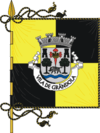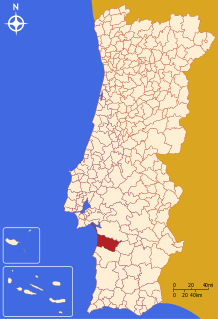Grândola
Grândola (Portuguese pronunciation: [ˈɡɾɐ̃dulɐ] (![]()
Grândola | |
|---|---|
 Flag  Coat of arms | |
 | |
| Coordinates: 38°10′N 8°34′W | |
| Country | |
| Region | Alentejo |
| Intermunic. comm. | Alentejo Litoral |
| District | Setúbal |
| Parishes | 4 |
| Government | |
| • President | Carlos Vicente Beato (CDU) |
| Area | |
| • Total | 825.94 km2 (318.90 sq mi) |
| Population (2011) | |
| • Total | 14,826 |
| • Density | 18/km2 (46/sq mi) |
| Time zone | UTC±00:00 (WET) |
| • Summer (DST) | UTC+01:00 (WEST) |
| Local holiday | Mary, mother of Jesus October 22 |
| Website | http://www.cm-grandola.pt |
Included in this municipality is Tróia (part of Carvalhal parish), a peninsula between the Atlantic Ocean and the Sado River. Also within the municipality is Serra de Grândola (Grândola Mountain). Nearest city: Alcácer do Sal.
The municipal holiday is October 22.
Grândola has its own railway station on the main line between Lisbon and Faro. Passenger trains are operated by Comboios de Portugal (CP).
Parishes
Administratively, the municipality is divided into four civil parishes (freguesias):[3]
- Azinheira dos Barros e São Mamede do Sádão
- Carvalhal
- Melides
- Grândola e Santa Margarida da Serra
Notable inhabitants
Gallery
 Monument to the Carnation Revolution
Monument to the Carnation Revolution
gollark: Can I send some eggs I want viewbombed, viewbombers?
gollark: The **Z**ombies are coming.
gollark: Fun fact: if you replace the `/view/` with `/click/` anyone viewing that counts as clicking it.
gollark: Clearly we should ban everyone from the server. It's the only way to be sure.
gollark: A whitepocalypse, if you will.
See also
- "Grândola, Vila Morena" – a song by Zeca Afonso inspired by the Carnation Revolution
References
- Instituto Nacional de Estatística
- "Áreas das freguesias, concelhos, distritos e país". Archived from the original on 2018-11-05. Retrieved 2018-11-05.
- Diário da República. "Law nr. 11-A/2013, page 552 54" (pdf) (in Portuguese). Retrieved 23 July 2014.
This article is issued from Wikipedia. The text is licensed under Creative Commons - Attribution - Sharealike. Additional terms may apply for the media files.